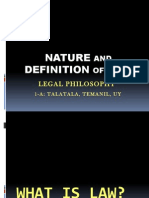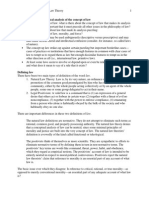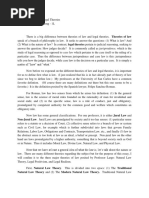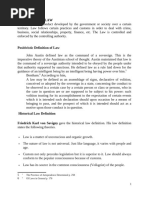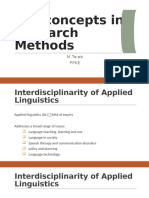Essay in Legal Philosophy
Uploaded by
aballacarlosjasonEssay in Legal Philosophy
Uploaded by
aballacarlosjasonHow law should operate in society (how it should govern human life) and what law
should substantially contain (what values should it contain) under a godless
worldview.
Law, in a strictly legal sense, is defined as a rule of conduct, just and obligatory, laid down by
legitimate authority for common observance and benefit. This definition alone is enough to contemplate
and promulgate legislation that would remove the presence of a higher being, metaphysical influence or
a divine presence where most of our laws are supposedly based from as explained by Thomas Aquinas
and his treatises on Natural Law and the common good, where he explained that the light of reason is
placed by nature, therefore by God, in every man to guide him in his acts.
To better explain this essay, the definition of the law will broke down to its essential parts to
provide reasoning and explanation on how a godless worldview of the law can work and how it should
operate in society.
Under a godless worldview, particularly using Legal Positivism as a basis since this point of view
is usually used to explain an opposition to Natural Law, it can then be explained that the existence and
content of laws depends on social facts and not on its merits. Simply put, laws are commands of human
beings and humanity will creates laws that will benefit itself regardless of morality. For example, the
terms just and obligatory are not exclusive to morality since a law can still be just provided that due
process and equal application of the law to everyone is provided hence the need for supposed fairness
has been satisfied. These are all statements of facts and can be established by rational arguments
without the need for moral judgment.
Legitimate authority meanwhile can also be described as a societal construct to enforce rules
that govern all the people living inside its territory and jurisdiction. There is nothing divine or moral in it
since a legitimate authority can be anything from tyrannical dictatorships to anarchist communes as long
as the people submit to its directions and obey the law of the land. This supposed legitimate authority
enforces the laws and wields the threat of sanctions for breaking these defined rules. Hence, there is
law and order functions as well as it can be with the risk of punishment to those who would disobey.
Empirical thinking would then provide that the common observance of the law further justifies
that the law and morality are totally complete entities and one does not spring from the other. Empirical
evidence would show that all knowledge of fact can be validated by sense experience. Imaginary beings
have no place in a court of reason and logic where evidence is paramount in enforcing a law otherwise a
unreasonable beliefs may then become a law of the land without any scientific basis which would insult
the thinking ability of a reasonable man. High-minded ideals and beliefs have no place in the law since it
must consider what is rather that what it ought to be. A logical system is in place to make sure that
correct decisions are deduced for the benefit of all and to counter unbiased and selfish rulings.
You might also like
- Toaz.info Salmond on Jurisprudence Pr 0a69efa5af7e319b5f467d6f5a234508No ratings yetToaz.info Salmond on Jurisprudence Pr 0a69efa5af7e319b5f467d6f5a2345085 pages
- For Students - Introduction To Law (Chapt 1-3)No ratings yetFor Students - Introduction To Law (Chapt 1-3)20 pages
- Rule of Conduct-The Law Mandates What Is Right and Prohibits What Is WrongNo ratings yetRule of Conduct-The Law Mandates What Is Right and Prohibits What Is Wrong8 pages
- MY PERSONAL JURISPRUDENCE I NOTES 2docxNo ratings yetMY PERSONAL JURISPRUDENCE I NOTES 2docx34 pages
- To End a War: A Short History of Human Rights, the Rule of Law, and How Drug Prohibition Violates the Bill of RightsFrom EverandTo End a War: A Short History of Human Rights, the Rule of Law, and How Drug Prohibition Violates the Bill of RightsNo ratings yet
- Introduction To Law The General Nature of Law Meaning of Law in General - Natural Law100% (4)Introduction To Law The General Nature of Law Meaning of Law in General - Natural Law5 pages
- Philosophy of Law Midterm Reviewer 2 Arellano University School of LawNo ratings yetPhilosophy of Law Midterm Reviewer 2 Arellano University School of Law9 pages
- JURISPRUDENCE: Natural Law Vs Legal Positivism: by 14 CommentsNo ratings yetJURISPRUDENCE: Natural Law Vs Legal Positivism: by 14 Comments9 pages
- Thomas S. Kuhn The Structure of Scientific Revolutions - Thomas S. Kuhn - Free Download, Borrow, and Streaming - Internet ArchiveNo ratings yetThomas S. Kuhn The Structure of Scientific Revolutions - Thomas S. Kuhn - Free Download, Borrow, and Streaming - Internet Archive4 pages
- CS3243 Foundations of Artificial Intelligence: AY2003/2004 Semester 2 Introduction: Chapter 1No ratings yetCS3243 Foundations of Artificial Intelligence: AY2003/2004 Semester 2 Introduction: Chapter 113 pages
- Habermas - From Formal Semantics To Transcendental Pragmatics Karl-Otto Apel's Original InsightNo ratings yetHabermas - From Formal Semantics To Transcendental Pragmatics Karl-Otto Apel's Original Insight24 pages
- Mid-Range Management Theory: Competence Perspectives On Modularity and Dynamic CapabilitiesNo ratings yetMid-Range Management Theory: Competence Perspectives On Modularity and Dynamic Capabilities25 pages
- Lev Vygotsky Sosiocultural Theory of DevelopmentNo ratings yetLev Vygotsky Sosiocultural Theory of Development27 pages
- JAMIE HALE - in Evidence We Trust - 2nd EditionNo ratings yetJAMIE HALE - in Evidence We Trust - 2nd Edition246 pages
- Thickening Thin Concepts and Theories - Combining Large N and Small in Comparative Politics (M. Coppedge)No ratings yetThickening Thin Concepts and Theories - Combining Large N and Small in Comparative Politics (M. Coppedge)13 pages
- Key Concept in Applied Linguistic ResearchNo ratings yetKey Concept in Applied Linguistic Research13 pages
- Chap 2 Review of Litrature Review & Developing Theoretical FrameworkNo ratings yetChap 2 Review of Litrature Review & Developing Theoretical Framework47 pages
- Designing A CLIL Unit © Isabel Pérez Torres: - de - Bloom - PDF 985846No ratings yetDesigning A CLIL Unit © Isabel Pérez Torres: - de - Bloom - PDF 9858462 pages
- 1 - Penelitian Ilmiah Dan Logical Thinking100% (2)1 - Penelitian Ilmiah Dan Logical Thinking40 pages
- Faculty - Department of Philosophy - UCLANo ratings yetFaculty - Department of Philosophy - UCLA4 pages
- Basic Principles and Concepts of Rational Choice100% (1)Basic Principles and Concepts of Rational Choice14 pages
- Philippine Literature in English Maam AdvenNo ratings yetPhilippine Literature in English Maam Adven9 pages

